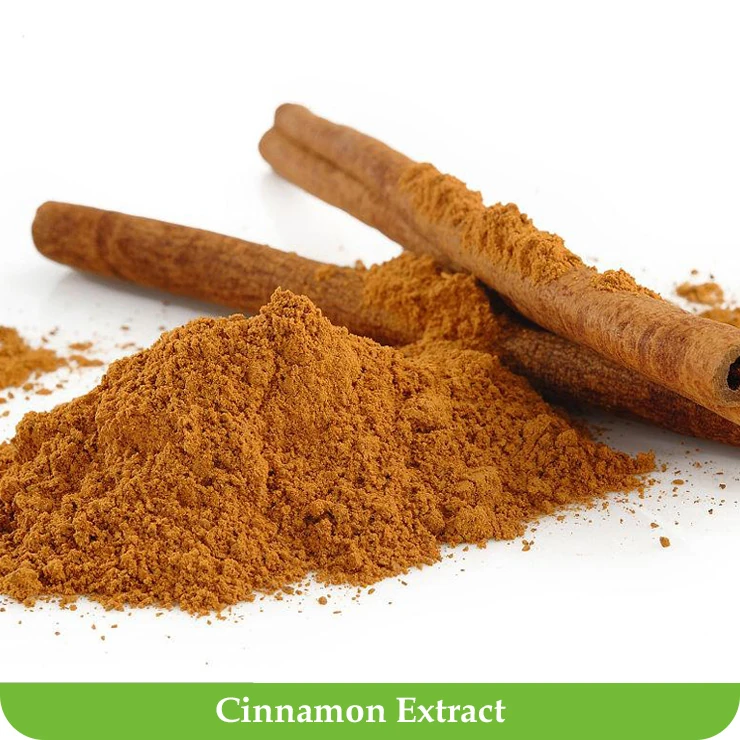Cinnamon extract is a concentrated form of cinnamon, typically derived from the bark of cinnamon trees, especially Cinnamomum verum (True Cinnamon or Ceylon cinnamon) or Cinnamomum cassia (Cassia cinnamon). The extract is made by soaking the cinnamon bark in alcohol or water to draw out the active compounds, primarily cinnamaldehyde, which gives cinnamon its distinct flavor and many of its health benefits.
Several common varieties of cinnamon.
- Chinese cinnamon (Cinnamomum cassia): Also known as cinnamon, Cinnamomum cassia is one of the most common varieties of cinnamon. Chinese cinnamon is mainly produced in Guangdong, Guangxi, Fujian, and other places in China, and has a strong aroma and sweetness. In traditional Chinese medicine, Chinese cinnamon is believed to warm the kidney, relieve cold and pain, promote blood circulation, and remove blood stasis, and is often used to treat diseases such as colds, arthritis, and dysmenorrhea.

- Ceylon cinnamon (Cinnamomum verum): Also known as true cinnamon, mainly produced in Sri Lanka, India, Indonesia, and other places. Ceylon cinnamon has a soft aroma and a slightly bitter taste. Ceylon cinnamon is common in Western cooking and is often used in baking, braising, and other dishes.
- Vietnamese cinnamon (Cinnamomum loureirii): Also known as red cinnamon, mainly produced in Vietnam, Cambodia, and other places. Vietnamese cinnamon has a strong aroma and a spicy taste. Vietnamese cinnamon is more common in Southeast Asian cuisine and is often used in dishes such as stewed meat and chicken.
- Indonesian cinnamon (Cinnamomum burmannii): Also known as Myanmar cinnamon, mainly produced in Indonesia, Myanmar, and other places. Indonesian cinnamon has a strong aroma and a sweet taste. Indonesian cinnamon is commonly used in traditional local dishes such as satay and curry.
- Japanese Cinnamomum japonicum: Cinnamomum japonicum, also known as cinnamomum cinnamomum, is mainly produced in Japan, Korea, and other places. Japanese cinnamon has a relatively fresh aroma and a sweet taste. Japanese cinnamon is commonly used in traditional Japanese dishes, such as sushi and barbecue.
- Mexican cinnamon (Cinnamomum zeylanicum): Also known as Mexican cinnamon, mainly produced in Mexico, Guatemala, and other places. Mexican cinnamon has a strong aroma and a sweet taste. Mexican cinnamon is commonly used in traditional Mexican dishes, such as chili pot roast and chocolate.
Uses of Cinnamon Extract:
- Flavoring: Cinnamon extract is often used in cooking and baking to add a strong cinnamon flavor without needing to use ground cinnamon.
- Health and Wellness: It is also used in dietary supplements due to its potential health benefits, such as improving blood sugar regulation, providing antioxidant protection, and having anti-inflammatory properties.
- Cosmetics: It can be found in skincare products for its antimicrobial properties and scent.
Health Benefits:
- Blood Sugar Control: Some studies suggest cinnamon extract may help lower blood sugar and improve insulin sensitivity.
- Anti-inflammatory and Antioxidant: The compounds in cinnamon have antioxidant and anti-inflammatory effects.
- Heart Health: Cinnamon extract may help reduce cholesterol levels, improving heart health.
Knowledge about cinnamon extract
- Source of cinnamon extract: Cinnamon bark extract is extracted from the bark of a cinnamon tree. Cinnamon trees are mainly distributed in Southeast Asia and southern China, and the quality of cinnamon in the Hunan Province of China is the best. Historically, cinnamon has been widely used in Chinese medicine and seasonings.
- Chemical composition of cinnamon extract: Cinnamon bark extract is rich in aromatic compounds such as cinnamic acid and cinnamaldehyde. Among them, cinnamic acid has anti-inflammatory and antioxidant effects, cinnamaldehyde has antibacterial and antifungal effects. The cinnamon bark extract also contains nutrients such as a variety of vitamins, minerals, and fiber.
- Health Benefits of Cinnamon Extract Cinnamon extract has a variety of health benefits. Cinnamon extract can improve blood sugar control and help reduce the risk of diabetes. Cinnamon bark extract has antibacterial and antifungal effects and can be used to prevent and treat oral and fungal infections. Cinnamon bark extract can also improve blood circulation, improve digestive function, and strengthen the immune system.
- Application of cinnamon extract: Cinnamon bark extract is widely used in food, cosmetics, and medicine. In food, cinnamon extract is used as a seasoning to enhance the aroma and taste of food. In terms of cosmetics, cinnamon extract can be used in skincare and oral care products to exert its antibacterial, antioxidant, and skin-soothing effects. In medicine, cinnamon extract is used in traditional Chinese medicine and health supplements to treat diseases such as diabetes, infections, and digestive problems.
- Safety of cinnamon extract In general, cinnamon bark extract is safe in moderate amounts.
However, excessive use can cause liver damage and allergic reactions.








